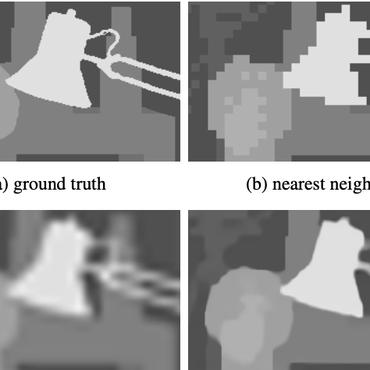Depth Estimation
797 papers with code • 14 benchmarks • 70 datasets
Depth Estimation is the task of measuring the distance of each pixel relative to the camera. Depth is extracted from either monocular (single) or stereo (multiple views of a scene) images. Traditional methods use multi-view geometry to find the relationship between the images. Newer methods can directly estimate depth by minimizing the regression loss, or by learning to generate a novel view from a sequence. The most popular benchmarks are KITTI and NYUv2. Models are typically evaluated according to a RMS metric.
Libraries
Use these libraries to find Depth Estimation models and implementationsSubtasks
Most implemented papers
AdaBins: Depth Estimation using Adaptive Bins
We address the problem of estimating a high quality dense depth map from a single RGB input image.
DINOv2: Learning Robust Visual Features without Supervision
The recent breakthroughs in natural language processing for model pretraining on large quantities of data have opened the way for similar foundation models in computer vision.
Sparse-to-Dense: Depth Prediction from Sparse Depth Samples and a Single Image
We consider the problem of dense depth prediction from a sparse set of depth measurements and a single RGB image.
Pyramid Stereo Matching Network
The spatial pyramid pooling module takes advantage of the capacity of global context information by aggregating context in different scales and locations to form a cost volume.
Multi-Task Learning as Multi-Objective Optimization
These algorithms are not directly applicable to large-scale learning problems since they scale poorly with the dimensionality of the gradients and the number of tasks.
Index Network
By viewing the indices as a function of the feature map, we introduce the concept of "learning to index", and present a novel index-guided encoder-decoder framework where indices are self-learned adaptively from data and are used to guide the downsampling and upsampling stages, without extra training supervision.
EPP-MVSNet: Epipolar-Assembling Based Depth Prediction for Multi-View Stereo
As a result, we achieve promising results on all datasets and the highest F-Score on the online TNT intermediate benchmark.
Deep Depth From Focus
Depth from focus (DFF) is one of the classical ill-posed inverse problems in computer vision.
Deep Ordinal Regression Network for Monocular Depth Estimation
These methods model depth estimation as a regression problem and train the regression networks by minimizing mean squared error, which suffers from slow convergence and unsatisfactory local solutions.
Unsupervised Monocular Depth Learning in Dynamic Scenes
We present a method for jointly training the estimation of depth, ego-motion, and a dense 3D translation field of objects relative to the scene, with monocular photometric consistency being the sole source of supervision.















 Cityscapes
Cityscapes
 KITTI
KITTI
 ScanNet
ScanNet
 NYUv2
NYUv2
 Matterport3D
Matterport3D
 Middlebury
Middlebury
 TUM RGB-D
TUM RGB-D
 SUNCG
SUNCG
 Taskonomy
Taskonomy
 2D-3D-S
2D-3D-S






